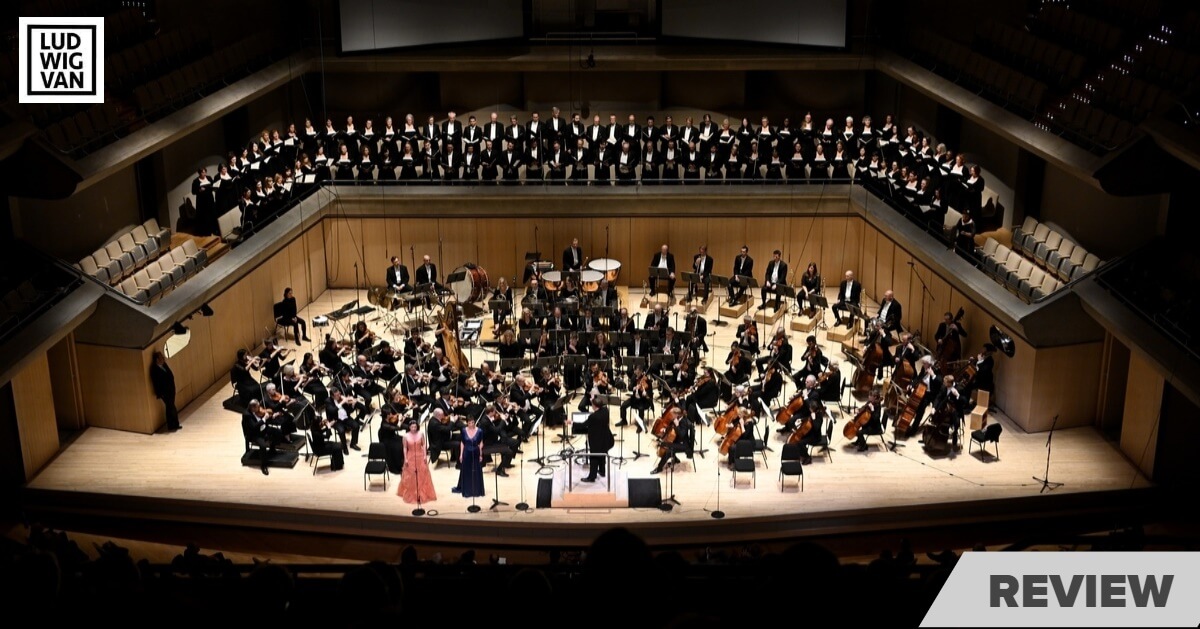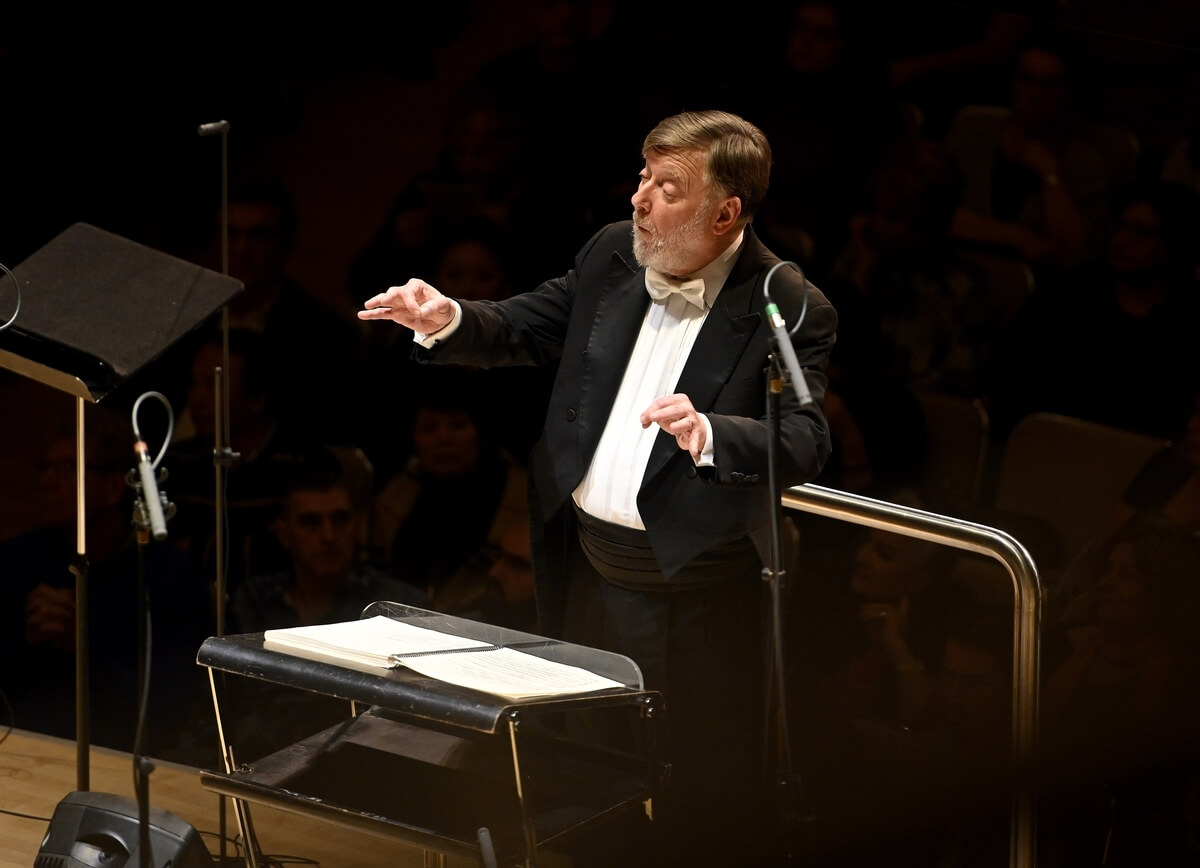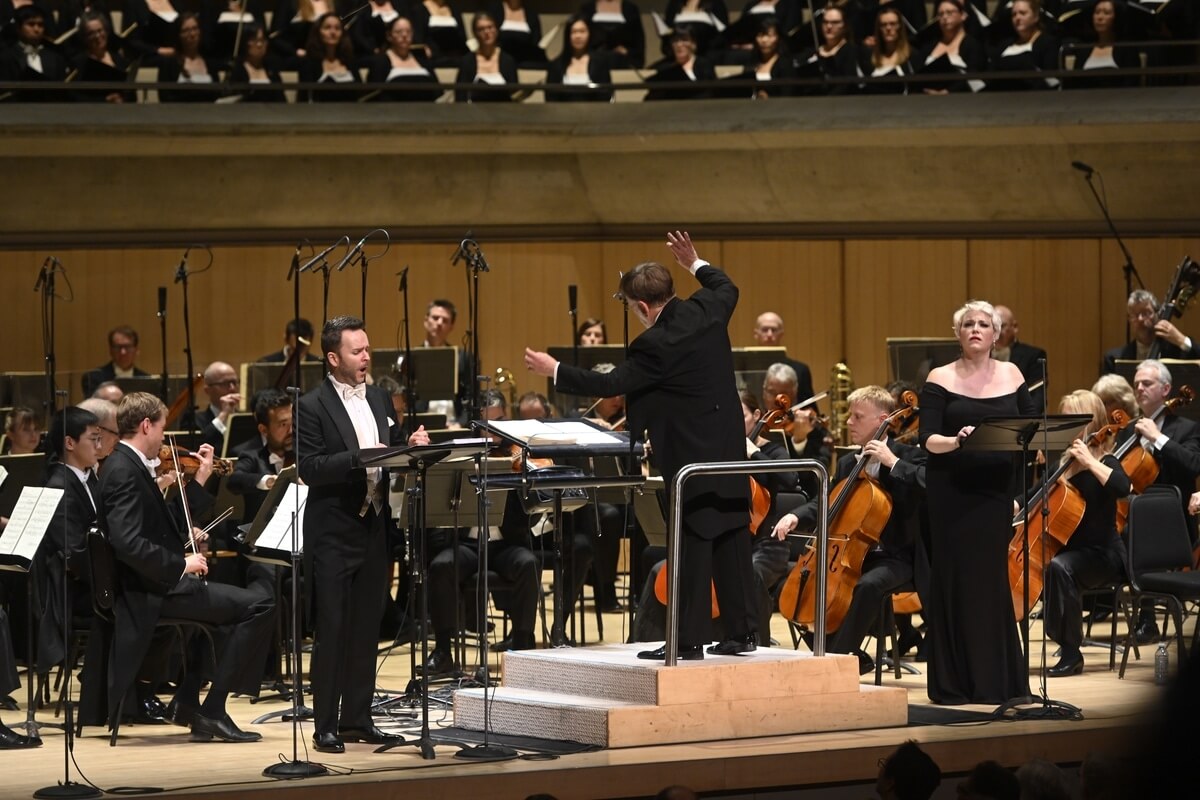The TSO, under the baton of Sir Andrew Davis, the Toronto Mendselssohn Choir, and a talented cast of singers, treat Toronto to a lively, nuanced performance in the nineteenth-century French grand opera tradition.

Massenet: Thaïs. Erin Wall, soprano (Thaïs); Joshua Hopkins, baritone (Athanaël); Andrew Staples, tenor (Nicias); Nathan Berg, bass-baritone (Palémon); Liv Redpath, soprano (Crobyle); Andrea Ludwig, mezzo-soprano (Myrtale); Emilia Boteva, mezzo-soprano (Albine); Stacey Tappan, soprano (La charmeuse); Neil Aronoff, baritone (Un serviteur); Toronto Mendelssohn Choir; conductor Sir Andrew Davis. Roy Thomson Hall, Nov. 7, 2019 8 p.m.
It is rare to see French Romantic opera in Toronto, let alone to hear it in an Opera-in-Concert format. All the more remarkable was conductor laureate Sir Andrew Davis filling that much-needed gap in the city’s concert life with a splendid Toronto Symphony Orchestra-hosted evening of Massenet’s Thaïs.
Sir Andrew Davis has conducted a full version of the work six times, notably at the Edinburgh Festival in 2011, and two years ago with the Melbourne Symphony, to name only two examples. He is an advocate of the opera but best of all the TSO, under Davis’s smart and robust direction, demonstrated Thursday night that there is a willing and ready appetite to receive Massenet’s operas here. Perhaps Toronto will one day become a destination for performing more of the nineteenth-century French grand opera tradition and repertoire that has been steadfastly under-represented in our city.
The performance was long, as expected, lasting over two-and-half hours with intermission, and easily a musical success on a variety of levels. The orchestra, unconfined to a pit, could explicate all of Massenet’s assiduous colourings from the stage with suitable lyric freshness and a plethora of timbre that convinced us all the TSO had been playing this repertoire regularly for decades. It was a fabulous evening for the TSO all around.
And the singing was only impeccable, which states a lot about the ready-made musical ability of the cast, made up of all-star singers who easily navigated the French performance tradition of performing lyrical mélodie all night.
The plot derives from Anatole France’s novella of the same title, and revolves around two personalities, a monk Athanaël, who tries of his own accord to convert the courtesan Thaïs, who is a character possibly largely fictionalized out of 4th-century Alexandria. The intense Catholic lensing of hair shirt penitence is considered to be historically inaccurate to the desert life of the Egyptian monks, and is largely a product of Anatole France’s Catholic education. France was more interested throughout his literary career in coming to terms with the question of what seemed to constitute salvation for each person. To be redeemed, did they gradually learn to live perfect lives? Or were they always imperfect, but embraced love and came to understand the Divine through the act of love?

France’s two questions play out in the personas of Athanaël and Thaïs throughout the opera. Joshua Hopkins sang the enormous role of Athanaël with stunning skill. His character’s bold, even bullying personality was spot on, depicting a monk who is often called too proud in his single-minded pursuit of winning the soul of the courtesan Thaïs. In the end, Athanaël discovers he is in love with Thaïs, and renounces his faith at her death-bed, while she, unaware of his worldly obsession with her, sees a vision of angels and saints welcoming her into the afterlife. Hopkins was remarkable in stamina, musicality, and sheer force in his performative stage presence, but above all, he presented a clear artistic grasp of the French singing idiom. He was an ideal casting for the role, and a prudish sharp contrast to the worldly Alexandrians he must unwillingly court if he is to win Thaïs’s soul as his prize.
Likewise, Erin Wall was a stunning, strong, and entirely sincere Thaïs. She owns this role and it is conspicuous that both concerts this week are being recorded so that we can hear Erin Wall as a Thaïs for our time with the TSO as ideal exponents for this repertoire under Davis’s skilled direction.
Wall’s sincerity was often overwhelming, particularly in the “Mirror Aria” where she begs for eternal life, fighting with her newly-awakened conscience that forces her to see her beauty as transient and her fading life as a courtesan. Or, in her struggle at the end of Act II between her enthused response to Athanaël and the thought of conversion, and her sudden but temporary devolution back into nihilism, Wall’s ability to channel different sides of Thaïs was consistently impressive.
It takes a strong cast to sing this work, and everyone else was solid. Andrew Staples was enviable as the cheerful Nicias, who sells his lands and mill to have one week with Thaïs. Staples has a gorgeous voice, and when I closed my eyes, I thought I had been transported back in time to mid-century performances of French grand opera, his voice was so convincing. His honey-coated timbre is warm opulent and natural, easily eliding from note to note at all times, as though he were born to sing this entire repertoire.
Bass-baritone Nathan Berg played the humble prior Palémon, who doubts Athanaël’s sincerity of winning Thaïs “for God”. The implication is that Athanaël is really winning Thaïs for himself, and that he does not know yet that he has been seduced by her beauty or is blinded by his own pride of winning the soul of a famed courtesan. Berg sings an important element of the plot with great understanding that helps to explain the story, one that ultimately predicts Athanaël’s downfall.

The Toronto Mendelssohn Choir was always beautiful, whether onstage or offstage, regardless of whether they were cast as monks or nuns, revellers or the dissolutes of Alexandria.
Rounding out the vocal soloists were soprano Liv Redpath (Crobyle) and mezzo-soprano Andrea Ludwig (Myrtale) as lyrically fine fellow courtesans. Emilia Boteva was a welcome voice once again, warmly singing the role of Albine the superior of the order of nuns. Soprano Stacey Tappan sang a fine La Charmeuse from the choir loft as part of a lovely trio.
Best of all, concertmaster Jonathon Crow played the famous standalone “Meditation” at the conclusion of Act I with a sweet succinctness that emulated well the state of contemplative life Thaïs was to enter. The theme returns four more times and in different contexts, most ironically when Athanaël sings his own mélodie around the “Meditation”, as though only aware of his own feelings, and no longer cognizant of his holy mission to be mentor to Thaïs and her new-found spirituality.
The opera may seem harsh in its depiction of physically austere, penitent life. Indeed, the imagery is very Catholic, and scholarship doesn’t find evidence for this taking place anywhere in the Eastern Orthodox, Alexandrian hesychast communities of the Egyptian desert in the 4th century.
Equally important to the sacred elements is the constant underpinning of the erotic suffusing the opera, whether in the libretto or in the music. And in the case of Athanaël, he fails to realize that his critics are right: he has never known love in life, while Thaïs has.
It is a consummate irony of this literature that the saintly Athanaël should serve as the imperfect example of loveless austerity, leading Thaïs to a more powerful kind of Divine Eros as he falls from saint to profligate, while Thaïs, who knows something of love, rises from sinner to saint, and seemingly through the power of Massenet’s lush musical depiction, experiences the eros in its divinized form.
This seems to underscore a truth for both Anatole France and Jules Massenet. The TSO’s lively, nuanced performance puts Love’s power into dramatic musical terms, demonstrating its universal constant in each of our lives. Love reveals itself in many complex ways to us all, but we can never be in control of it nor how it will manifest within us at any given moment, regardless of whether we are sinner or saint.
#LUDWIGVAN
Want more updates on classical music and opera news and reviews? Follow us on Facebook, Instagram or Twitter for all the latest.
- SCRUTINY | Opera Atelier’s Film Of Handel’s ‘The Resurrection’ A Stylish And Dramatic Triumph - May 28, 2021
- HOT TAKE | James Ehnes And Stewart Goodyear Set The Virtual Standard For Beethoven 250 - December 15, 2020
- SCRUTINY | Against the Grain’s ‘Messiah/Complex’ Finds A Radical Strength - December 14, 2020



